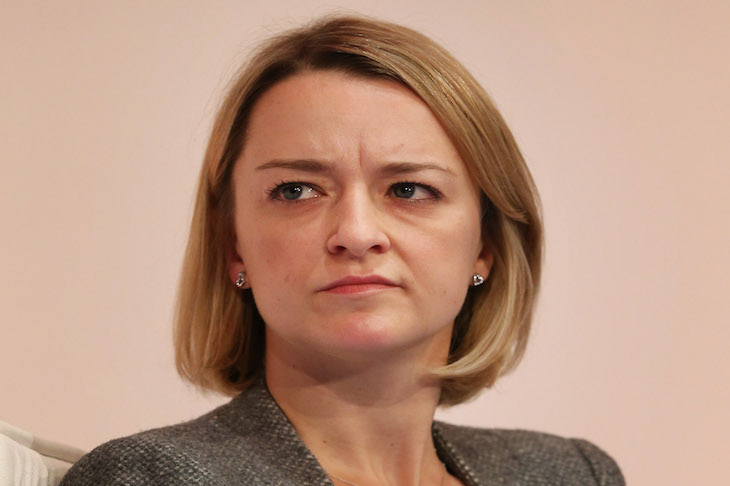This is an article about Twitter, so you might decide to ignore it. Social media is not real life, after all, and many sensible people dismiss it as meaningless noise: ‘it’s just Twitter’. But this article is also about the current state of politics and journalism, neither of which can – sadly – be discussed without reference to Twitter, so bear with me.
Twitter is, to use a technical term, going batshit about Laura Kuenssberg, the BBC political editor. This isn’t the first time, and I’m sure it won’t be the last, but that doesn’t mean it’s not deserving of comment.
Kuenssberg’s name is all over Twitter because of an incident at a London hospital that Boris Johnson visited today. There, he was approached by the father of a child being treated there. The man challenged the PM about NHS staffing levels and accused the PM of using the hospital for a ‘press opportunity’. The event was filmed and broadcast by the BBC.
It later came to light – via the Downing Street spokesman previously known as Guido Fawkes – that the man in question was Omar Salem, who describes himself as a Labour activist.
Mr Salem himself had started tweeting about the incident at around noon today, writing:
https://twitter.com/omarsalem/status/1174279099935789057?s=21
Around three hours later, Kuenssberg used her own Twitter account to report Mr Salem’s party affiliation. (Responding to the Guido report, Salem himself appeared to confirm that his affiliation had some relevance to his exchange with Johnson, writing: ‘My Labour values are WHY I back proper support for the NHS. I am not ashamed of them.’)
Kuenssberg also quote-tweeted Mr Salem, allowing her own followers to see his words. And at this point, all hell broke loose. Egged on by various Corbyn supporting troll accounts, thousands of people declared that the BBC’s political editor had engaged in targeted harassment and partisan spin against the distressed father of a sick child.
At the time of writing, almost 5,000 people have taken the trouble to reply directly to Kuenssberg’s tweet reporting Salem’s words, many of them in highly personal and offensive terms. Many also talk about co-ordinating complaints to the BBC about her actions.
Now, this is so obviously stupid that I almost ignored it. Why waste pixels on the actions of a horrible mob intent on abusing a journalist for doing the basic job of journalism: reporting facts? Why bother to observe the significant fact that Omar himself published the words that Kuenssberg reported, and the fact that he himself affirms that his politics are relevant to his actions and so to the story?
And to be honest, if this had been about another journalist, say Robert Peston or John Pienaar, I’d have ignored it. But it wasn’t. It was about a woman, and that makes this different. The online abuse of women in the public eye, women like Laura Kuenssberg, is different, and not just in volume: as I’ve written before, the way the mob targets her is grimly revealing.
I also think the impact is different.
Not long ago, I was discussing this stuff with a prominent female politician, who I hope will forgive me for reporting some of our conversation here. She got in touch to take issue with something I wrote here last week about Ruth Hunt, the former chief executive of Stonewall and soon a cross-bench peer. (The conversation, incidentally, made me worry about that article, and wonder if I owe Hunt an apology.)
Had I considered, the politician asked me, that by writing about Hunt in the way that I did, I was adding to the chance that she would face abuse and harassment online from people who disliked her and the things that she had done?
Had I also, the politician asked me, considered what it’s like to be on the receiving end of such abuse? The effects, she said, can be miserable. No matter how tough, how famous, how secure you might appear, to be the target of constant, personal abusive and hateful messages is corrosive and damaging.
She’s not the only woman in the public eye to say such things. Others I know speak privately about how it hurts, how it makes you doubt yourself, question yourself. How it can make grown women, women used to fame and public challenge, simply afraid. Very few who have had this experience will say these things publicly, partly for fear of inviting more abuse, and partly because as women holding senior roles in fields where senior women are still in the minority, they fear that such a show of vulnerability could do them professional harm. Many feel they have to show they’re ‘tough’ to be taken seriously.
Sometimes the details of this kind of abuse surfaces in court cases and the like, but my sense is that much of this grim story about the abuse of women in the public eye — the threats, the panic buttons at home, the mail-screening, the personal security and the fear — is still hidden from view.
I don’t know how the latest storm of horrible stupidity directed at Laura Kuenssberg for doing her job makes her feel; I haven’t asked her. But even if she’s wholly unaffected by it, I’d still argue it should be taken more seriously, simply for the chilling effect it has on others. A society where some people – some women – are afraid to speak freely is not really free.
So I am writing about Laura Kuenssberg and Twitter because it’s not ‘just Twitter’. It matters.
Laura Kuenssberg did her job. She should not be abused or mobbed for that. That shouldn’t need to be said, but it does, and more of us should say it.







Comments